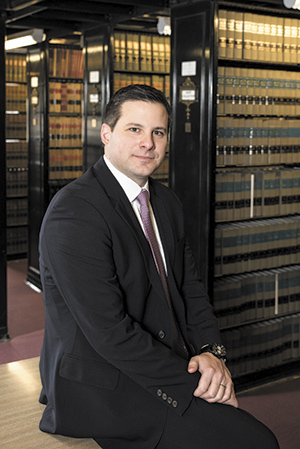Subscriber Benefit
As a subscriber you can listen to articles at work, in the car, or while you work out. Subscribe NowChristopher Bayh bears the surname synonymous with two generations of Indiana political titans, but those who know and work with him say he works as hard as anyone as a go-to litigator in complex, high-stakes matters. He also works to help homeless people in Indianapolis, and pro bono efforts have included representing asylum-seekers fleeing violence.
 Is having a famous last name more of a help or a hindrance, and why?
Is having a famous last name more of a help or a hindrance, and why?
I am proud of my family, but I seldom think about the name. I’m sure it has opened some doors and closed a few others, but I can only control the effort I give, the quality of my work, and the way I treat people. Those are the things I try to focus on, and in the end, those are the criteria on which we are all judged.
When did you first decide you would become a lawyer, and what motivated you?
My senior year in Bloomington, I worked as an assistant in the Monroe County Probation Department. I started out as a clerk and a Spanish interpreter, but gradually got the opportunity to handle a few case files on my own. I also regularly observed court proceedings, and even participated on occasion, interpreting for a few Spanish-speaking clients at simple hearings. I think this experience, more than any other, motivated me to pursue a career in law.
Who is someone who inspired or mentored you, and what did you learn from them?
My parents. I cannot match what they have accomplished in life, but I can strive to live up to the example of their work ethic and integrity. They have taught me so many things, of course, but one that stands out is the lesson that there is no substitute for being dependable and trustworthy.
What’s been the most rewarding aspect of your practice?
Two things: First, the client interaction. I love building relationships, and nothing motivates a lawyer like knowing how much the client depends on his or her work. Second, the writing. It’s what I enjoy doing most, and a skill that I work on constantly.
What do you most enjoy doing when you’re not in the office?
I love playing with my daughters and teaching them new things, and spending warm weekend afternoons with my wife, Jessica, on our back patio. I am also an avid, if amateur, cook.
What drew you to your volunteer work to address homelessness?
My mother. When I was in high school, she turned volunteering for our church into a full-time office job. A major component of that work was an initiative to transition individuals and families from homelessness into stable employment and housing. I spent some time helping out and meeting the folks in the program. Since then, homelessness has been a special cause for all of us.
Where do you see yourself in 20 years?
Professionally, right here at Barnes & Thornburg. I love my job and I love my colleagues. I hope to have a robust litigation practice with long-term clients, who see me not only as their zealous advocate, but as a trusted business adviser. On the personal side, the kids should be in college by then, and Jessica and I have a long travel list!
What’s something about you not many people know?
Most people don’t know that I played football for a few years at IU. And for those who knew that, most don’t realize how spectacularly unathletic I was.
What has been your most memorable case?
Early in my career, I was given the opportunity to take the lead on a pro bono case before the Seventh Circuit. It was an Eighth Amendment, prisoner’s rights case, in which my firm represented the prisoner-appellant. It was my second year out of law school, so this was my first opportunity to lead the brief writing and argue a case. It was a thrilling experience, and in the end the panel issued a unanimous opinion reversing the district court and reinstating the client’s case.
How do you see the legal profession changing in the next decade?
Software and automation are assuming a major role. So far, in my practice, it has not been a threat, but instead has helped increase efficiency and ensure top-quality service. I see that trend continuing.
What was your most memorable job before becoming an attorney?
The job at the probation department in Bloomington, above. I learned so much, not just about the criminal justice system, but about public service, government administration, immigration law, addiction and many other important issues that impact our society.
If you hadn’t pursued a legal career, what would you be doing instead?
If I weren’t doing this, I probably would want to be a journalist or a columnist. Like my work now, I would have the opportunity to meet many interesting people, to wrestle with important issues, and to use the written word to explain and persuade.•
Please enable JavaScript to view this content.
